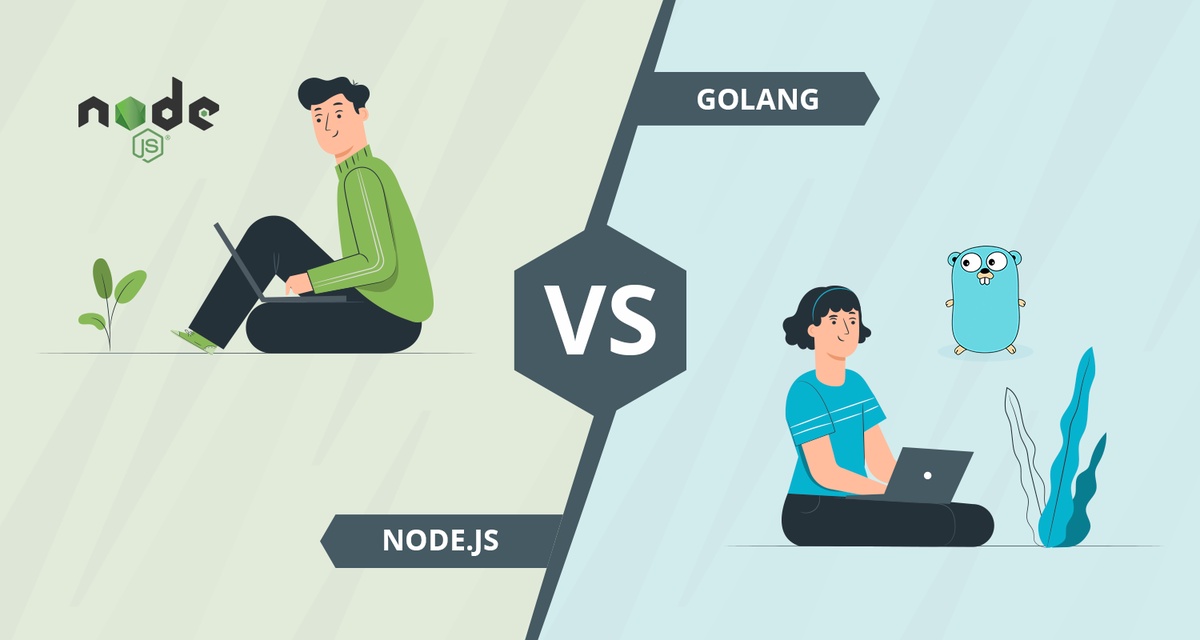If you are having trouble deciding which language to use for your next project - Go or Node Js - you're not alone. Both have their benefits and drawbacks, so it can be difficult to choose. This blog post will provide a comparison of the two languages regarding performance, scalability, and usability, to aid in your decision-making.
In it, you will find an examination of the strong and weak points of both options and advice on the type of projects they are most suited for. Read on to find out more and decide which one will work best for your requirements.
What are Go and Nodejs?
Go and Node Js are two of the most popular open-source programming languages. Developed by Google in 2009, Go (or Golang) is a general-purpose language that features static typing, which helps developers create and maintain code quickly.
Nodejs is a JavaScript runtime environment released the same year, and allows developers to create fast and scalable network applications by using an event-driven, non-blocking I/O model. In recent years, both languages have grown in popularity due to their emphasis on scalability and speed.
Go is particularly adept at building large-scale web projects and command line applications, and is suitable for distributed systems and cloud computing. Nodejs is a powerful language, perfect for server-side development and real-time applications that need high scalability and performance.
Business owners must carefully consider their project requirements when deciding which of these two programming languages is best for them. Go and Nodejs have different advantages and capabilities, so it's important to choose the right one for the job.
What are the differences between Go and Node Js?
Go and Nodejs are both powerful, open-source programming languages. Precisely, they are used to build a variety of applications from web apps to mobile apps. But what makes them different from each other?
Go is a statically-typed language, meaning it has strict rules about the types of data that can be used in a program. This can make coding with Go more rigid than coding with Node Js. Go also does not have the vast library of modules or packages that Node Js does, making it better for developers who need to develop something from scratch. On the other hand, Nodejs is a dynamically-typed language, meaning there are fewer restrictions on data types and it has an extensive package repository.
In terms of performance, Go generally outperforms Nodejs. Its compilation process helps it to run faster and smoother, while Nodejs' JavaScript environment often leads to more errors. Furthermore, Go is also better suited for complex tasks and large projects as it requires less code than Nodejs.
Finally, Go is relatively new compared to Nodejs, which means it has fewer tutorials, tools, and resources available. This can make it difficult for developers who are just starting out. However, Nodejs has been around for years and has plenty of resources available to help beginners get up to speed quickly.
Good Read: Node.Js Vs Golang
What are the similarities between Go and Node Js?
Go and Nodejs are both open-source, cross-platform runtimes that empower developers to build and deploy applications. Both programming languages use dynamic typing and incorporate garbage collection to help maximise efficiency and streamline memory management. In addition, they are both adept at event-driven programming, making them ideal for the creation of real-time applications.
Moreover, Go and Node Js offer access to the same core libraries, allowing developers to repurpose existing code in their development processes. Examples of this include the HTTP, stream, and fs modules which facilitate interaction with the file system and the making of web requests.
When it comes to performance, the two programming languages can offer unique advantages, depending on the needs of the project. Go has better throughput whereas Nodejs has lower latency. As such, it's essential to carefully consider the requirements of your project when selecting the best programming language for your project.
Which one should you choose?
When it comes to selecting between Go and Node Js, there are several factors to bear in mind. As a business owner, it is important to evaluate the strengths and weaknesses of each technology to make an informed decision. Go is well-suited for heavy-duty applications with considerable amounts of data and complex programming requirements, and is especially useful for those which demand high scalability and reliability.
Furthermore, its language features enable developers to quickly produce top-notch and dependable code. On the other hand, Nodejs is ideal for applications requiring lightweight components and swift response. Moreover, its event-driven architecture is especially useful for real-time web applications and its large array of packages simplify development. Ultimately, your choice should be based on your application's needs. Go is a strong pick if your app necessitates scalability and reliability, while Nodejs is a wise choice for lightness and speed.
Conclusion
When selecting a language to develop your project, it is critical to consider the project’s specific needs. Go is perfect for backend development due to its scalability and dependability. Nodejs is perfect for frontend development due to its quick runtime, easy installation, and large array of packages.
The decision of which language is best for you lies in the specifics of your project. Should you decide to hire web developers in India to bring your ideas to fruition, Go and Node Js developers are easily accessible from online marketplaces and freelancer websites. Therefore, it is simple to find someone that meets your criteria.


No comments yet